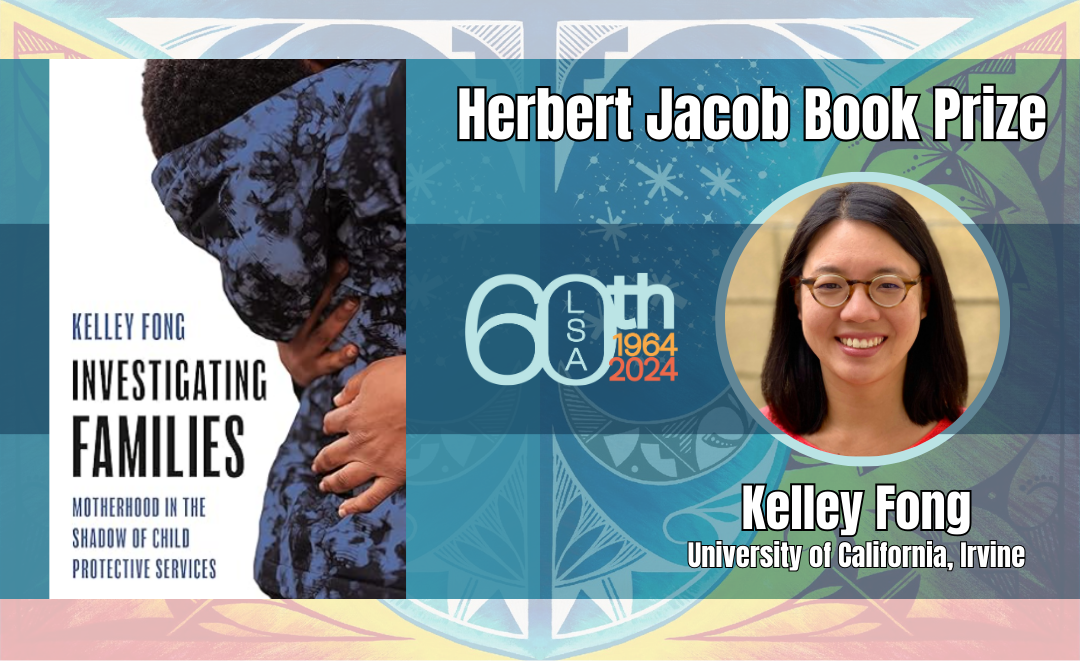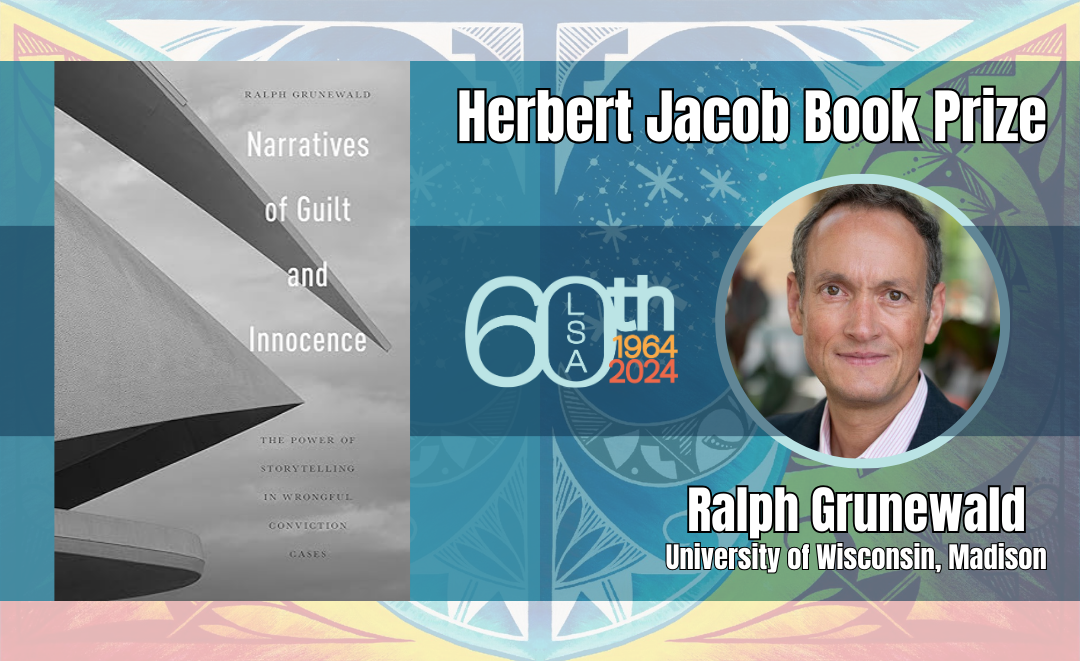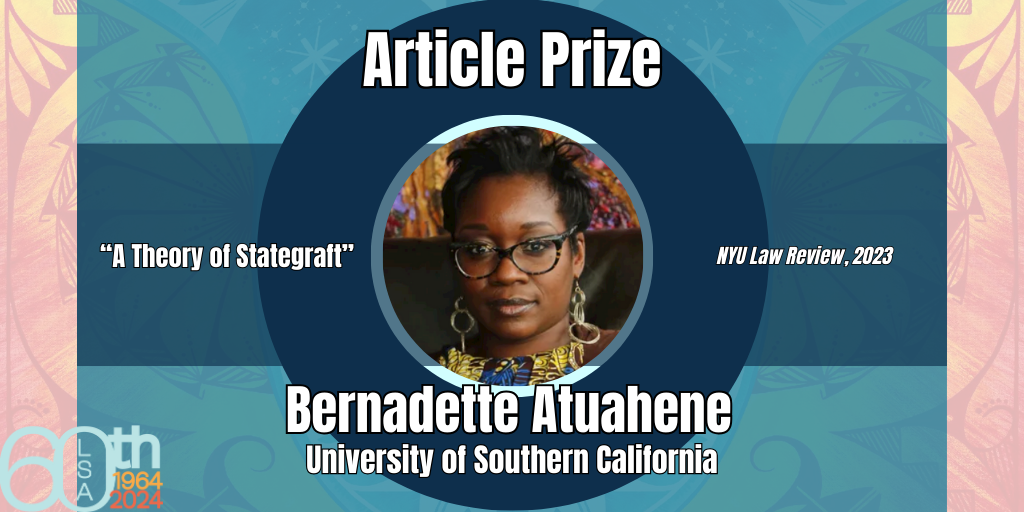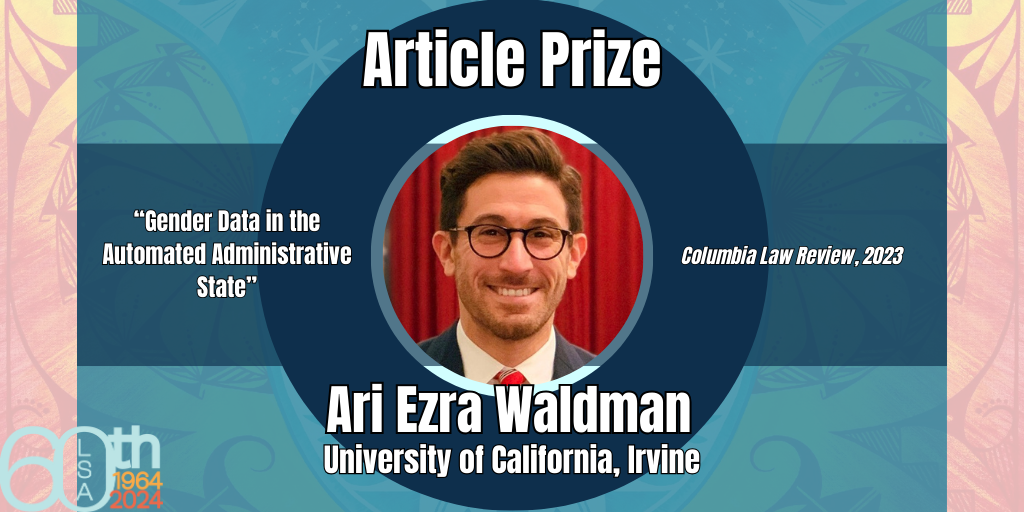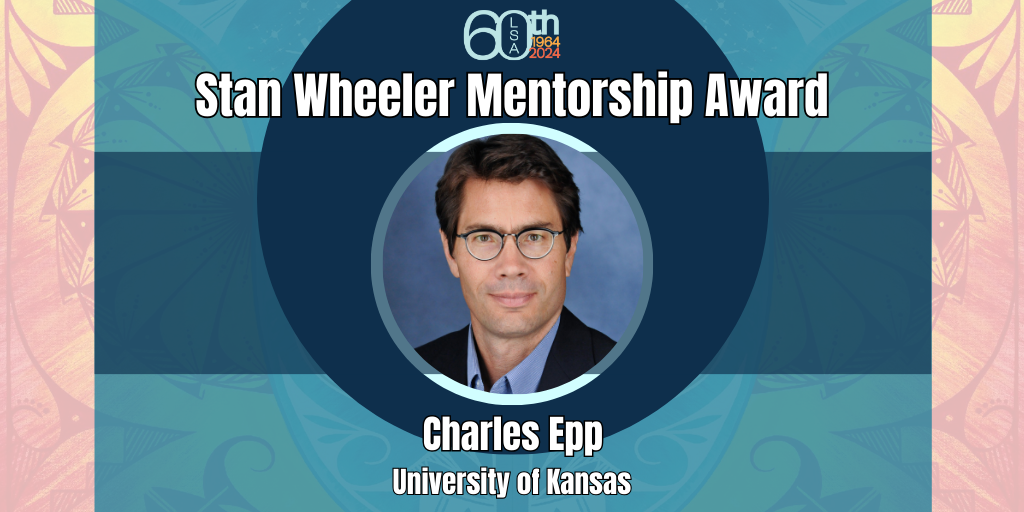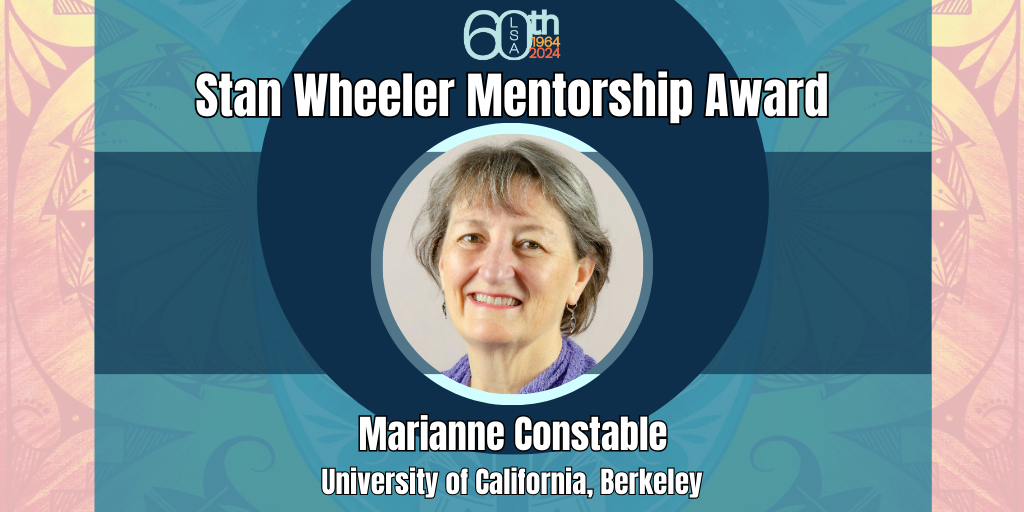The Law and Society Association Honors its 2024 Award Winners!
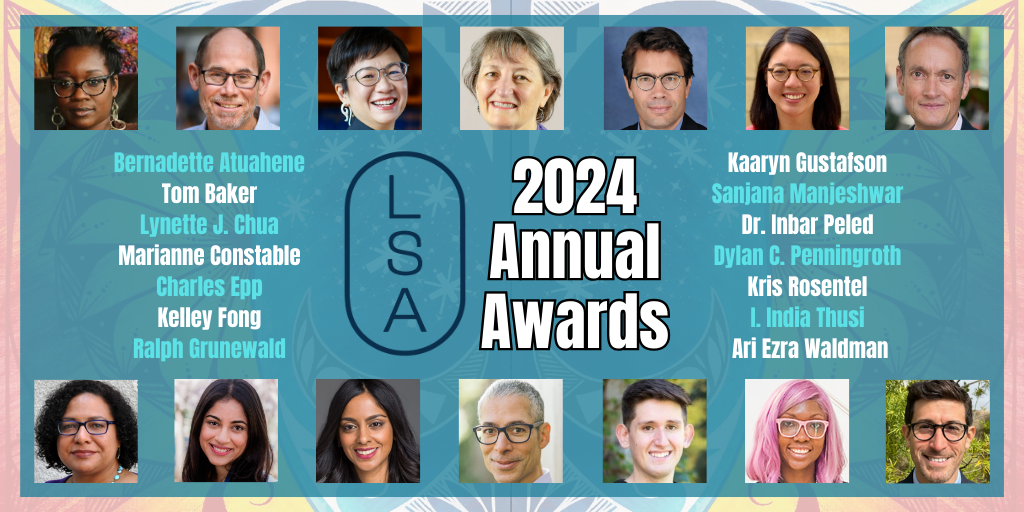
AMHERST, Mass. – The Law and Society Association extends a warm congratulations to the 18 winners of its 2024 Annual Awards.
LSA, which celebrates its 60th anniversary this year, honors leading international scholars each summer for their groundbreaking publications and contributions to the study of law and society. The association will honor winners at its 2024 Annual Meeting, which takes place June 6-9, 2024 in Denver, CO.
The awards ceremony is scheduled for Thursday, June 6, at 4:45 p.m. MT. Annual Meeting registration is required to attend the ceremony. To view more information about each of the winners, check out our Awards Page.
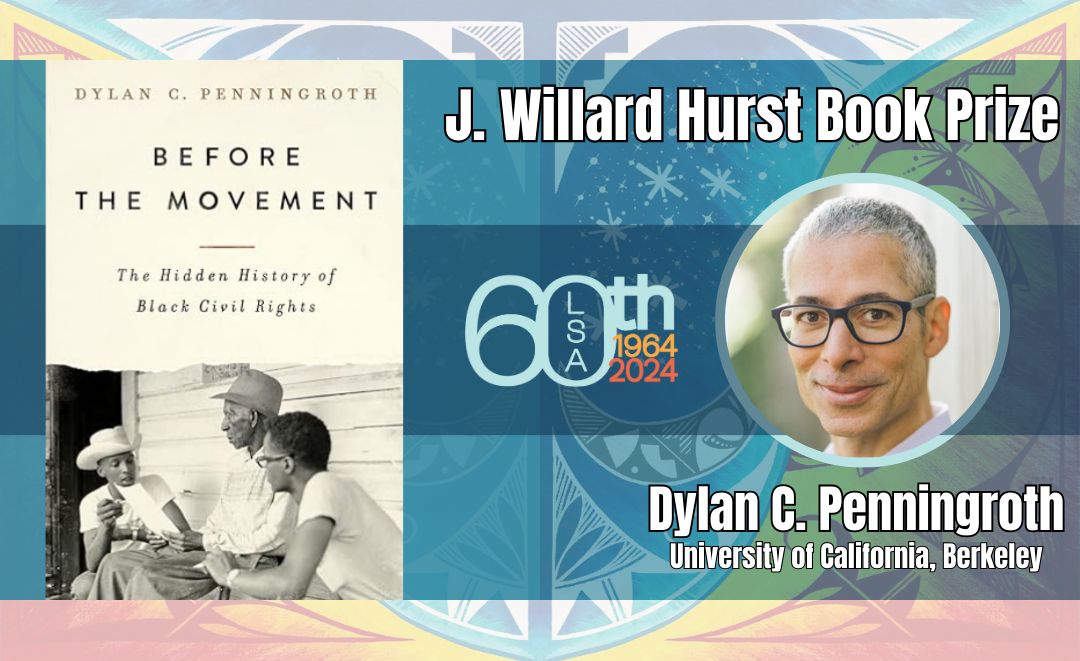
J. Willard Hurst Book Prize
WINNER: Dylan C. Penningroth, Before the Movement: The Hidden History of Black Civil Rights
Professor Penningroth’s Before the Movement masterfully achieves an impossible feat: it uses a wide and unwieldy archive alongside personal reflective narrative to offer a clear and compelling argument about law’s experience in the lived world. This book is at the core of what groundbreaking law and society historical scholarship is – it is engaging and accessible while expanding our understandings about an important topic, and it reflects deep and pain-staking research to bring alive archives that would otherwise go unnoticed. In bringing alive the “legal consciousness” of people in their everyday interactions of the law (i.e., mundane disputes and cases), Professor Penningroth offers a more nuanced and fuller dimension to the history of Black civil rights in the United States before it was categorized as one.
Herbert Jacob Book Prize
Co-Winner: Kelley Fong, Investigating Families: Motherhood in the Shadow of Child Protective Services
Investigating Families unveils how the United States’ reliance on child protective agencies make motherhood precarious for people who are already marginalized. Using multi-site ethnography, interviews, and extensive qualitative analyses, Professor Fong exposes the implications of depending on child protective services as a first-response for families experiencing poverty and adversity. Fong focuses on how mothers experience the fear of child protective services even when contact with the agency never materializes. She emphasizes that, shrouded in the promise of assistance, child protective agencies use scare tactics like surveillance and investigation to maintain power over marginalized mothers. Her work paves the way for new approaches to helping families.
Co-Winner: Ralph Grunewald, Narratives of Guilt and Innocence: The Power of Storytelling in Wrongful Conviction Cases
In Narratives of Guilt and Innocence, Professor Grunewald uses wrongful conviction cases in the United States as exemplars for intersecting narratives that construct legal realities, even when those legal realities are objectively false. Yet the takeaway from the book is how the combination of legal, narratological, and comparative lenses elucidate the role of truth in justice systems, both in the United States and elsewhere. Grunewald expertly unfurls layers of legal elements with a keen eye toward revealing narrative structures and determinative effects for defendants charged with crimes.
Law and Society Association Article Prize
CO-WINNER: Bernadette Atuahene, “A Theory of Stategraft”
Professor Atuahene’s paper builds a theory of Stategraft to define and interrogate what happens when the state takes property from individuals in violation of state laws and human rights. Differentiating this from processes like eminent domain, Professor Atuahene describes the predatory state and the role of Stategraft in reconceptualizing harm, the stability of democracy, and in its potential for social movements. Professor Atuahene’s paper offers Stategraft as a new conceptual domain, ripe for exploration more broadly in law and society scholarship.
“A Theory of Stategraft” deftly applies theoretical innovation to social problems, representing an innovative project with impressive theoretical and practical applications in the area of focus that does much to illuminate other significant issues of law and society as well. Professor Atuahene’s piece, impressive in scope, has the potential to define the field of law and society more broadly.
CO-WINNER: Ari Ezra Waldman, “Gender Data in the Automated Administrative State”
“Gender Data” considers how the systematic erasure of transgender, nonbinary, and gender-nonconforming individuals is not merely a consequence of technology, but also a product of law. Professor Waldman analyzes how legal mandates, forms, and other limitations embedded in the fabric of law shape data. The paper ends with principles for reform, offering a path forward.
Professor Waldman’s article is exceptionally engaged with law and society scholarship and frames, a focus that allows the paper to work well as both an empirical article and a legal argument. The far-reaching implications of the work extend well beyond gender into other automated categorization processes. Professor Waldman’s scholarly project is striking in its innovation.
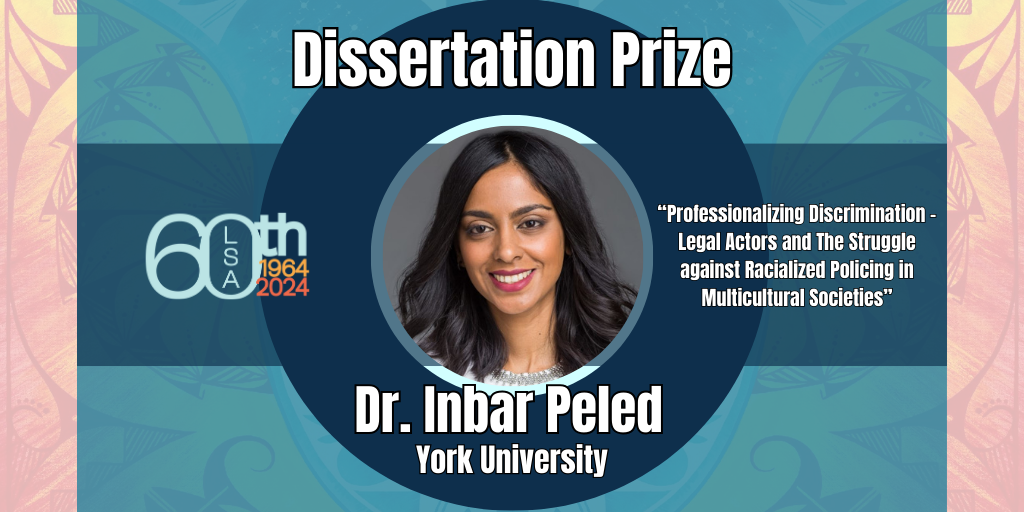
Law and Society Association Dissertation Prize
WINNER: Dr. Inbar Peled, “Professionalizing Discrimination: Legal Actors and The Struggle against Racialized Policing in Multicultural Societies”
Dr. Inbar Peled’s dissertation is a timely, ethnographic probe into the ways in which defense attorneys, prosecutors, and judges navigate legal norms and rules to both comply with and resist discriminatory policing. Using an impressive mixed-methods study, Dr. Peled coins the term “professionalized discrimination” to describe how legal actors use professional tropes to “cover” the tacit scripts associated with their nonprofessional selves, drawing on political ideology, neoliberal scripts, and strategies of self-management, in ways that allow discrimination to persist.
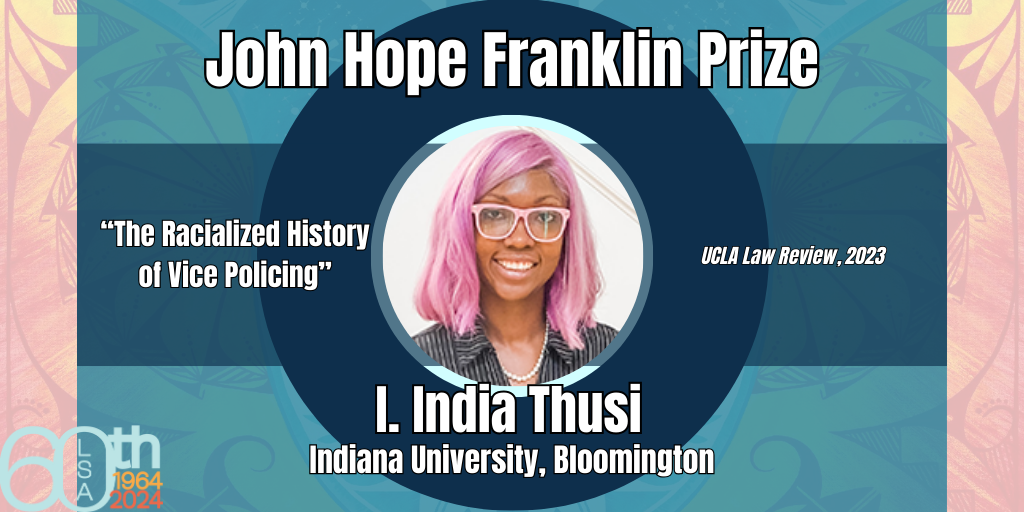
John Hope Franklin Prize
WINNER: I. India Thusi, “The Racialized History of Vice Policing”
India Thusi’s “The Racialized History of Vice Policing” provides an enduring scholarly contribution at the intersection of policing, abolition, and legal history. Thusi adopts an abolitionist framework and provides a much-needed analysis of vice policing as a mechanism to sustain racism and racialized marginalization. This well-written and compelling article is the beginning of a rich and important project that will continue to open up new avenues in research on race, racism, and law for years to come.
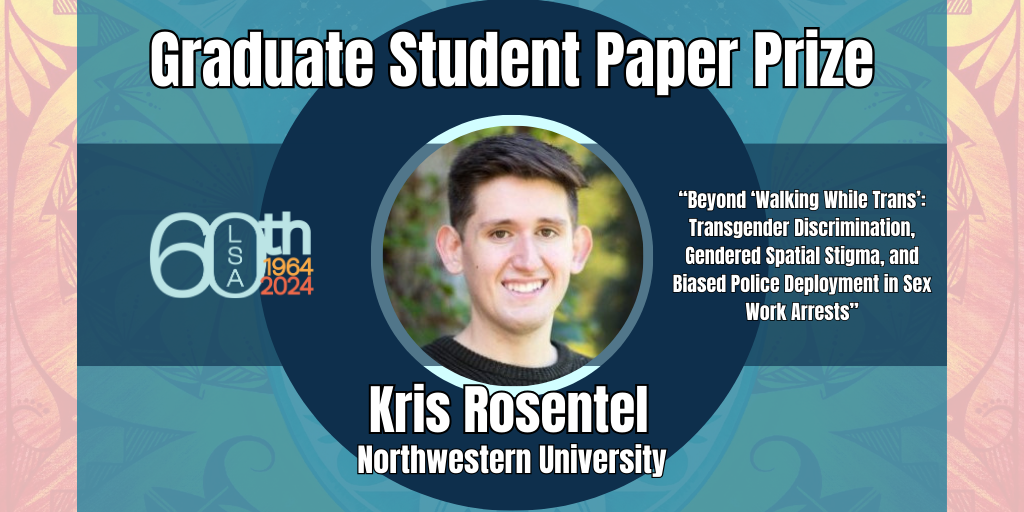
Law and Society Graduate Student Paper Prize
WINNER: Kris Rosentel, “Beyond ‘Walking While Trans’: Transgender Discrimination, Gendered Spatial Stigma, and Biased Police Deployment in Sex Work Arrests”
Kris Rosentel’s “Beyond ‘Walking While Trans’” represents a meaningful contribution to existing scholarly literature on policing of trans sex workers. Addressing the relative dearth of studies on gender and sexual bias in police deployment, Rosentel uses statistical modeling and mapping/spatial analysis to review a dataset of over 1,200 sex work-related arrests over a four-year period by the Chicago Police Department. Rosentel’s findings suggest that “both ‘walking while trans’ and ‘congregating while trans’ can be linked to broader state efforts to control gender and sexuality,” partially because they “disrupt the public-private dichotomy, which relegates acceptable expressions of feminine sexuality to the domestic sphere.”
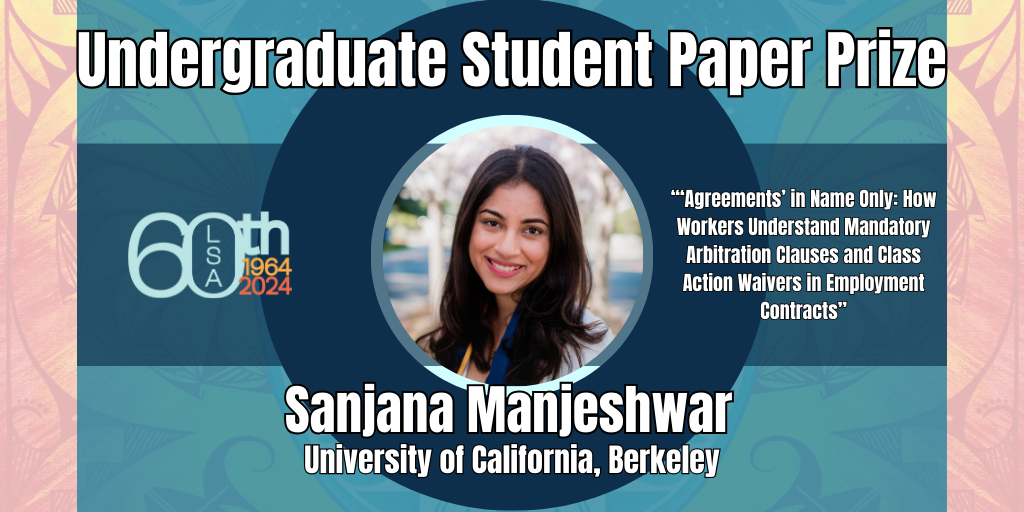
Law and Society Association Undergraduate Student Paper Prize
WINNER: Sanjana Manjeshwar, “‘Agreements’ in Name Only: How Workers Understand Mandatory Arbitration Clauses and Class Action Waivers in Employment Contracts”
When it comes to mandatory arbitration clauses, is meaningful consent really possible? Sanjana Manjeshwar tackles this question by exploring how “power relations between employers and workers make it difficult to refuse to sign arbitration agreements that are a condition of employment.” Using a survey experiment, Manjeshwar teases out how “plain-English explanatory language” affects employee understanding when it comes to the meaning, implications, and fairness of mandatory arbitration clauses.
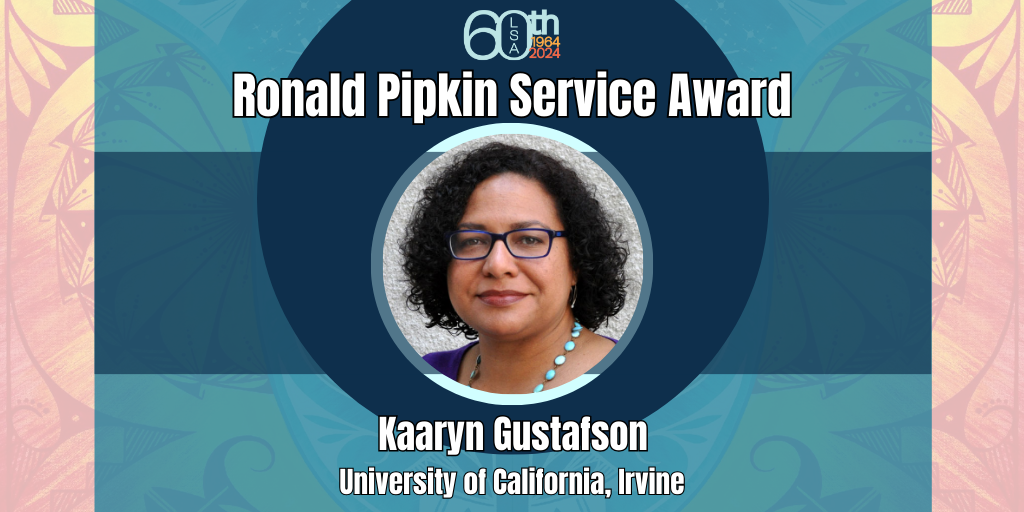
Ronald Pipkin Service Award
WINNER: Kaaryn Gustafson
A distinguished member of the Law and Society Association for nearly three decades, Professor Kaaryn Gustafson’s unwavering commitment to service goes far beyond the call of duty. In addition to serving on the Board of Trustees and various prize committees, Professor Gustafson is a long-standing chair of the Diversity Committee—a role she takes very seriously. Professor Gustafson’s scholarly achievements related to law, the social sciences, and policy have earned her countless professional accolades, but equally impressive is the depth and quality of her engagement with the law and society community, which is marked by innovation, leadership, and humanity.
Stan Wheeler Mentorship Award
CO-WINNER: Charles Epp
Professor Charles Epp’s work on rights and discrimination may attract media attention from outlets such as the New York Times, Washington Post, Los Angeles Times, USA Today, and Univision, but that doesn’t make him any less approachable to the students he has mentored over the years. On the contrary, his efforts to diversify sociolegal scholarship by making it available to a wider range of individuals clearly expresses his commitment to public policy and social change. Professor Epp’s egalitarian manner has allowed him to support and gain the trust of countless aspiring scholars, especially first-generation, international, racially minoritized, mature, and otherwise nontraditional students.
CO-WINNER: Marianne Constable
A leading figure in legal rhetoric and philosophy, Professor Marianne Constable serves as a conduit for mentees to enter new intellectual and social worlds. Her seminars and working group meetings unite “law students, graduate students, professors, and practitioners” in conversation about law and society scholarship, allowing junior scholars to gain confidence in the value of their contributions while exposing established academics to fresh ideas and perspectives. Professor Constable’s perfect blend of “generosity and precision” has allowed her to establish lifelong professional and intellectual relationships with her mentees, many of whom view her as a refuge within a frequently complex graduate school environment.
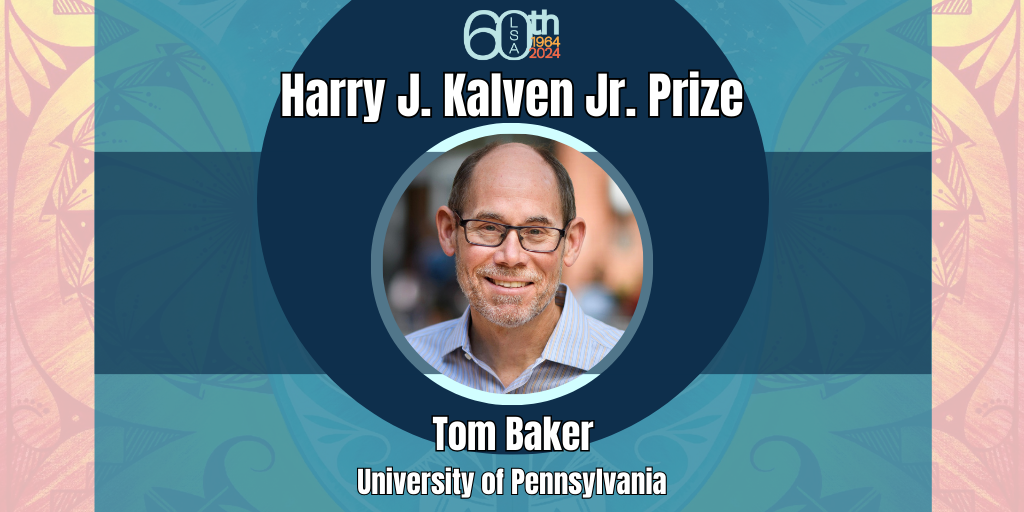
Harry J. Kalven, Jr. Prize
WINNER: Tom Baker
Insurance law is the core of how societies regulate themselves, but before Professor Tom Baker’s work, it was a nearly invisible topic. With his empirical scholarship on insurance-in-action, which examines how insurance actually works as opposed to how it is supposed to work, Professor Baker has blazed a trail in developing insurance as a sub-field of law and society scholarship. His careful, interview-based work is the key pillar of ‘Insurance as Governance’ literature, which has fundamentally shifted how we think about insurance practices, regulation, and governance.
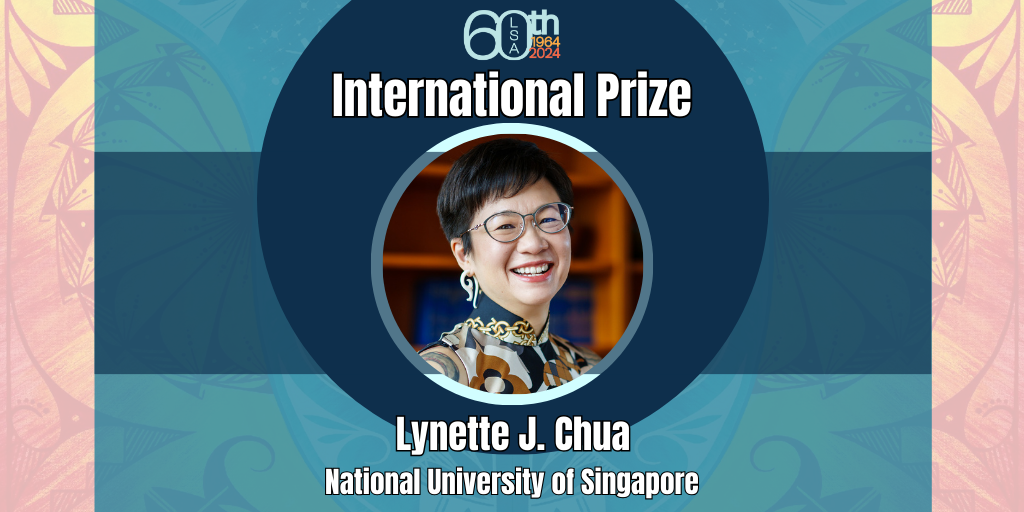
Law and Society Association International Prize
WINNER: Lynette J. Chua
Dr. Lynette Chua is a significant presence in the world of law and society scholarship. This is because not a lot of people can do what Dr. Chua does. She approaches her ethnographic research on legal mobilization for LGBTQ+ communities in countries such as Singapore, Taiwan, Mainland China, Vietnam, and Myanmar with, as one nominator put it, “sensitivity that deeply respects how everyday legal actors understand their political activism through the prism of personal lives and identities.”
Dr. Chua’s award-winning books, Mobilizing Gay Singapore and The Politics of Love in Myanmar, as well as her dozens of influential articles, are widely cited around the world, but her impact doesn’t end there. A champion of law and society scholarship in Asia, Dr. Chua is heavily engaged in training and mentorship through organizations such as the Asian Law and Society Association and LSA. In addition serving as an LSA Trustee Class Representative from 2017 to 2019, she has co-chaired the Law & Emotions Collaborative Research Network and sat on numerous other committees.
Congrats to all of the LSA 2024 Honorable Mention selections!
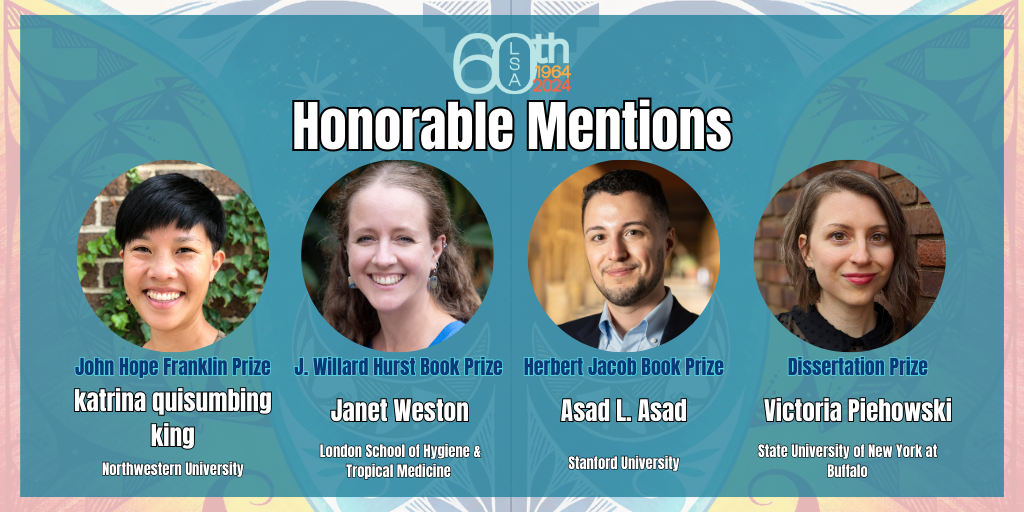
LSA kicks off its 2024 Annual Meeting on Thursday, June 6. Visit this year’s conference website to learn more.
2024 LSA AWARDS
J. Willard Hurst Book Prize
Dylan C. Penningroth | University of California, Berkeley
Honorable Mention – Janet Weston | London School of Hygiene & Tropical Medicine
Herbert Jacob Book Prize
Kelley Fong | University of California, Irvine
Ralph Grunewald | University of Wisconsin-Madison
Honorable Mention – Asad L. Asad | Stanford University
Law and Society Association Article Prize
Bernadette Atuahene | University of Southern California
Ari Ezra Waldman | University of California, Irvine
Dissertation Prize
Inbar Peled | York University
Honorable Mention – Victoria Piehowski | State University of New York at Buffalo
John Hope Franklin Prize
I. India Thusi | Indiana University Bloomington
Honorable Mention – katrina quisumbing king | Northwestern University
Graduate Student Paper Prize
Kris Rosentel | Northwestern University
Undergraduate Student Paper Prize
Sanjana Manjeshwar | University of California, Berkeley
Ronald Pipkin Service Award
Kaaryn Gustafson | University of California, Irvine
Stan Wheeler Mentorship Award
Charles Epp | University of Kansas
Marianne Constable | University of California, Berkeley
Harry J. Kalven Jr. Prize
Tom Baker | University of Pennsylvania
Law and Society Association International Prize
Lynette J. Chua |National University of Singapore



